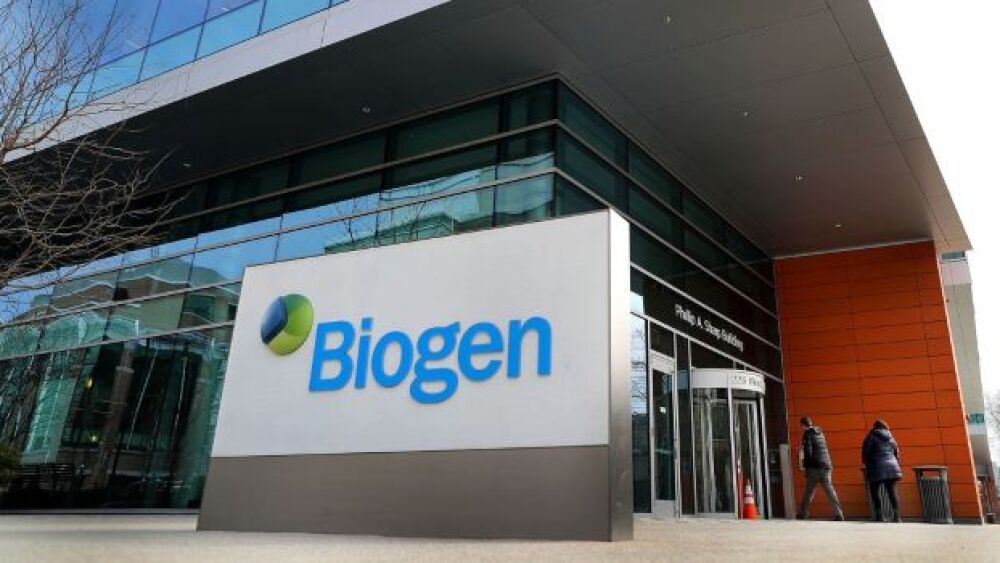Biogen announced topline results from the Phase III VALOR trial of tofersen for superoxide dismutase 1 amyotrophic lateral sclerosis.
Biogen shared positive results from phase III results of tofersen. (John Tlumacki/The Boston Globe via Getty)
In what is sure to create comparisons to its strategy for Alzheimer’s drug Aduhelm (aducanumab), Biogen announced topline results from the Phase III VALOR trial of tofersen for amyotrophic lateral sclerosis (ALS).
Specifically, the drug is being evaluated for superoxide dismutase 1 (SOD1) amyotrophic lateral sclerosis. The trial did not hit the primary endpoint. Still, the company is putting a positive spin on the findings, emphasizing favorable trends in multiple secondary and exploratory markers.
ALS is a fatal progressive neurodegenerative disease. The average survival is three to five years, usually from respiratory failure. SOD1-ALS is a rare, genetic type of ALS that makes up about 2% of the global ALS population.
About the Tofersen Drug
Tofersen is an antisense drug. It binds to SOD1 messenger RNA (mRNA), which helps it degrade by RNase-H, decreasing the synthesis of SOD1 protein production.
Biogen’s emphasis on the positive news in this study seems to have parallels to its approach to Aduhelm for Alzheimer’s disease. That drug failed clinical trials and was abandoned, then revived after the analysis of subgroups of the clinical trial studies. Working closely with the U.S. Food and Drug Administration (FDA)—too closely, some critics say, which has sparked investigations by the Health and Human Services’ Office of Inspector General (HHS OIG), as well as the House Committee on Oversight and Reform—the company resubmitted the drug for approval. The FDA approved the drug on June 7, but it is considered one of the most controversial approvals in FDA history. It has resulted in three members of the FDA’s Central Nervous System Drugs Advisory Committee resigning in protest.
The company’s Phase III VALOR study for ALS failed to hit the primary endpoint of change from baseline to week 28 in the Revised Amyotrophic Lateral Sclerosis Functional Rating Scale (ALSFRS-R). There were also serious neurological adverse events in the tofersen cohort but not in the placebo arm. These serious side effects included myelitis, the serious inflammation of the spinal column.
The company seems to be emphasizing the toferson’s positive effects on the SOD1 levels, which at least hints they might try to get the drug approved under an accelerated approval pathway that depends upon surrogate biomarkers rather than clinical improvement—much the same approach taken with Aduhelm. The company indicated it was “actively engaging with regulators, the medical community, patient advocacy groups and other key stakeholders around the world to determine potential next steps.”
Timothy Miller, M.D., Ph.D., principal investigator of VALOR and ALS Center Director at Washington University School of Medicine, St. Louis, stated, “The results from the VALOR study are encouraging as they show reduction of SOD1 protein, reduction of neurofilament, a potential biomarker for neurodegenerative disease, and positive signals across multiple key endpoints including measures of important aspects of the daily lives of SOD1-ALS patients. The wait for new options has been long and difficult for the ALS community, and we welcome this important research advancement in this difficult to treat disease space.”
Biogen indicated that “trends favoring tofersen” were observed across multiple secondary and exploratory markers of biologic activity and clinical function. These include motor function, respiratory function, and quality of life. Differences of 38% were seen between the tofersen and placebo groups in change from baseline in total CSF SOD1 protein in the faster-progressing populations, and 26% in the slower-progressing populations. In the change from baseline in plasma neurofilament light chain (NfL), a potential marker of neuronal degeneration, there was a 67% difference in the faster-progression population and 48% in the slower-progressing populations.
Biogen partnered on the drug with Ionis Pharmaceuticals in 2018. Brett P. Monia, Ph.D., Ionis’s chief executive officer, stated, “The topline results of the Phase III VALOR study showed signs of reduced disease progression across key secondary and exploratory endpoints, including biomarker data, clinical outcomes and quality of life measures. These data represent an important step forward in our commitment to find new treatments for this devastating disease.”





